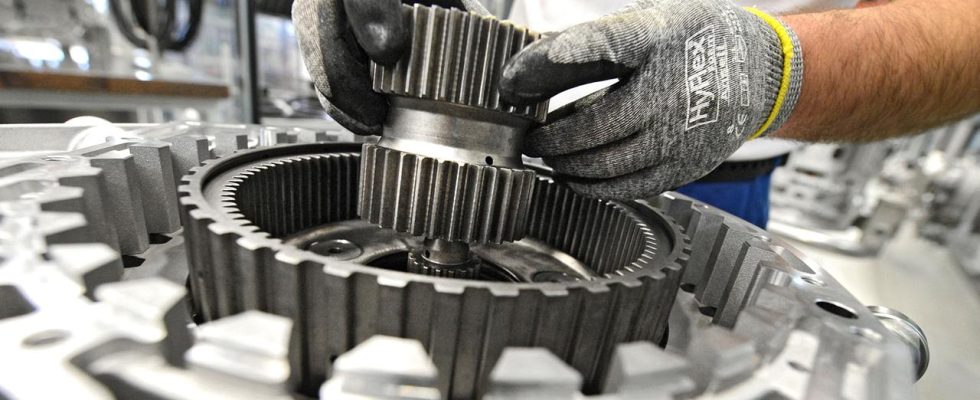analysis
The German auto industry is facing the biggest change in its history. Suppliers such as Bosch and ZF Friedrichshafen have already announced job cuts. According to experts, the transformation could take full effect in 2024.
If you’re looking for a simple screwdriver or a drill attachment for your home drill, you’re probably in the wrong place at the Paul Horn GmbH tool factory in Tübingen. The company that advertises gear milling, thread whirling and gear skiving systems is more like the hardware store for the industry. Paul Horn has been producing precision and special tools since 1969, often custom-made for very specific work steps in the factory.
Their most important customer is the automotive industry. Managing Director Matthias Rommel will not soon forget the year 2023: “It was an amazing year.” Rommel means this in the sense of incredibly turbulent. “We had a brilliant start in the industry with a very good first half of the year.”
The past few months, however, have been difficult. There was a lack of orders and inflation was also noticeable in the tool factory. “For me it was a year of extreme, unplanned and sometimes chaotic cost increases,” says Rommel.
It’s about tens of thousands of jobs
The mood in Germany as a car country is clouded: While the German car manufacturers Volkswagen, Mercedes and BMW are announcing increases in sales for January to September 2023, and car exports and new registrations are rising again, suppliers are complaining about declines in production and are cutting jobs in the automotive sector on a massive scale.
“It is now becoming more noticeable what this transformation really means,” says industry expert Stefan Bratzel from the Center of Automotive Management in Bergisch Gladbach. The expert is not surprised by the announcement by the world’s largest automotive supplier Bosch, which plans to cut 1,500 jobs in the areas of development, administration and sales in the future. Neither is the planned closure of an entire factory of the automotive supplier ZF Friedrichshafen.
“If electromobility becomes more important, it will have an impact on jobs across the entire industry,” says Bratzel, who expects up to 160,000 jobs to be lost as a result of the transformation. But this forecast is not new. “We did that five years ago.” In 2024, Bratzel believes, this trend will worsen even further.
Car manufacturers have to learn cultural change
The automobile professor from Bergisch Gladbach emphasizes that traditional car manufacturers would have to develop much more towards software companies: “Software will be an essential part of the new value creation. The entire corporate culture must change accordingly. And the established car manufacturers are having an enormously difficult time with this.”
On the one hand, this is because two business models had to be served for many years: In addition to the combustion engine division, the new electromobility. On the other hand, large, established companies would have to learn to lead again. “The whole of Germany is now essentially undergoing this transformation. The German automotive industry has been persecuted for years, but now the industry itself has to attack again,” said Bratzel.
Competition from Asia
The industry expert is certain that the competition is particularly lurking in Asia. A current study by the management consultancy Roland Berger with the investment bank Lazard also comes to the conclusion that Asian manufacturers and suppliers are among the winners in the market.
They therefore benefit “from the electrification of the drive train and digitalization – technologies that manufacturers in Asia have been concentrating on for some time and which are in greater demand there than in other regions,” says the “Global Automotive Supplier Study”. The authors are convinced that the supplier market will remain a growth business, “but with different components, with different customers and for different suppliers than today.”
“We follow our customers”
The Paul Horn tool factory from Tübingen is also closely monitoring the market and is now increasingly investing abroad because, for example, the production of parts for cars with combustion engines is moving to Eastern Europe. “We follow our customers,” says managing director Rommel.
“We are currently busy catching up in Germany,” emphasizes Stefan Bratzel from the Center of Automotive Management. “If we want to become more successful again in the next ten to 15 years, we have to get ahead of the wave again.”
To do this, you have to invest in a more focused manner. The expert sees good opportunities in the area of automated and autonomous driving, for example. German manufacturers are already at the forefront here.
At the Paul Horn tool factory, the situation is expected to remain tense in 2024. If sales don’t fall any further, managing director Matthias Rommel will be satisfied. “We remain compulsory optimists,” said Rommel.

